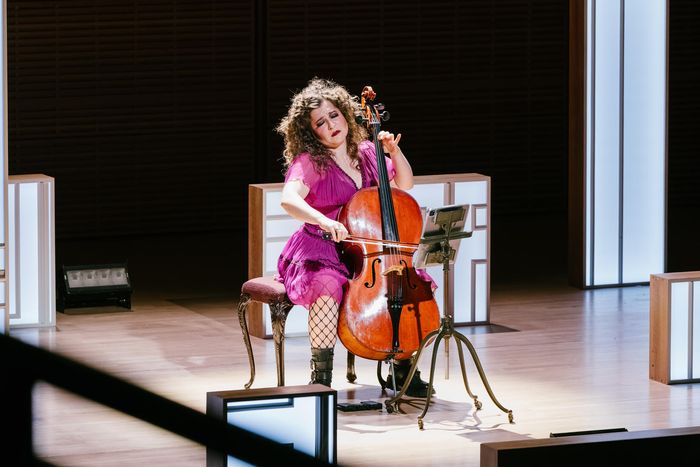
In her determination to be interesting, the cellist Alisa Weilerstein has made herself perplexing. She is deeply immersed in “Fragments,” a multiyear mission in which she’s commissioning short pieces from more than two dozen composers and interweaving them with the movements of Bach’s six cello suites. On Tuesday, she brought the second part of that project to Zankel Hall in a one-cellist one-act theater show directed by Elkhanah Pulitzer. Bathed in emerald or fuchsia light, costumed by Molly Irelan in a short dress, fishnet stockings, and clunky boots, Weilerstein shared the stage with Seth Reiser’s sets, an arrangement of slabs like so many sawn-up doors. She alternated sections of Bach’s Second Suite with music by an international collection of composers: Alan Fletcher, Ana Sokolović, Caroline Shaw, Daniel Kidane, and Gity Razaz. To discover which bits were whose or anything else about them, audience members had to wait until afterward, pick up a program on the way out, scan a QR code, and read up on the way home.
There’s nothing new about conscripting Bach into contemporary culture. Old-fashioned in his own time, rediscovered decades after his death, and revered ever since, his music has proven adaptable, indestructible, perpetually influential, and immune to fashion. Cellists especially find him inescapable, since they grow up with his suites and keep playing them throughout their careers. So I can understand why Weilerstein would want to reuse them as scaffolding for a whole new repertoire of solo cello music. And I also recognize the urge to hammer together a new creation out of disjointed bits; assemblage, too, has a distinguished pedigree.
But Fragments 2 felt more like the product of spinning the radio dial than a carefully chosen playlist. Whatever expressive unity it possessed came from the unabated ferocity of Weilerstein’s playing, the way she yanked the bow across the strings, digging into each note, slapping staccatos, or firing off a quick passage in violent bursts. I have often found her a mesmerizing musician, fearless and burbling with intelligent passion. Her playing is never wan or neutral, though it can sound hectoring. And I admire her desire to keep expanding both her own and her instrument’s horizons. Yet in this exploded context, even her Bach sounded choppy and jittery, as if she were trying to get through it on the way to the next new score.
As for those commissioned pieces, Weilerstein’s conceit made them difficult to follow or even to distinguish from one another. It’s not that they all sounded the same (though her intensity did tend to homogenize them in spirit) but that, like a stack of jumbled canvases, they clamored for separate frames. More crucially, it wasn’t clear how either Bach or his latter-day colleagues benefited from sharing a program.


